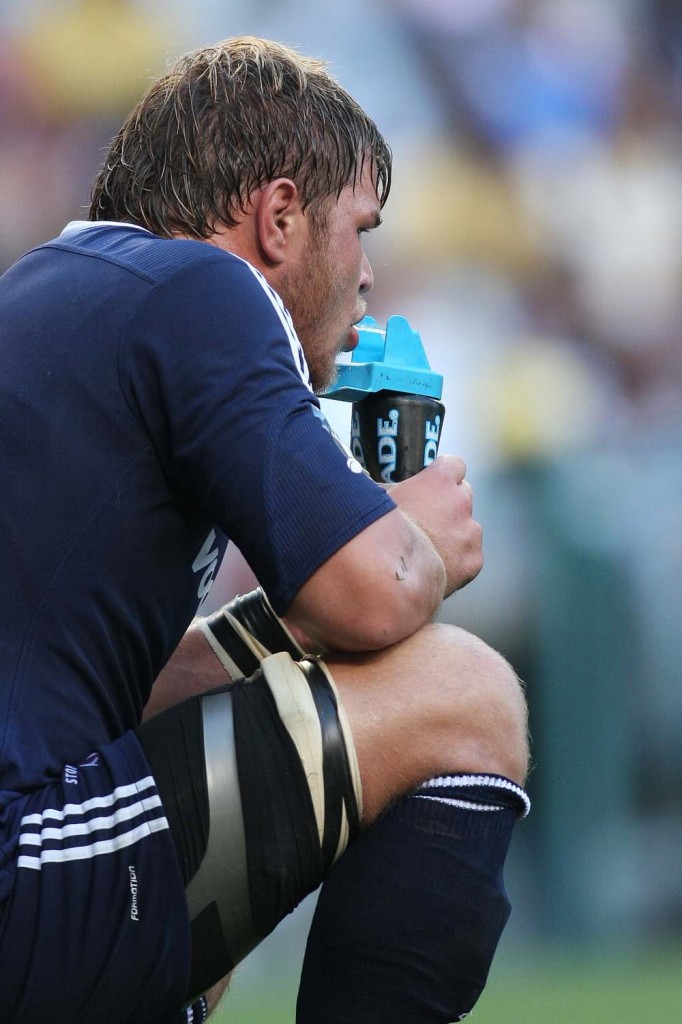Going up – the effect of altitude on Vodacom Super 14 teams

Duane Vermeulen enjoying Powerade
Much is made of the travel challenge in the Vodacom Super 14, with teams crossing many time-zones to play matches. This is a topic we’ll address in future, but an equally challenging aspect of the tournament is the altitude problem faced by coastal teams when they play in South Africa. The Lions, the Bulls and to a lesser extent, the Cheetahs, all play their home matches at what is classified as moderate altitude between 1000m and 1700m.
There is no question that altitude affects performance. In soccer, statistical analysis has found that an increase in altitude of 1000m is worth about half a goal to the home team. In other words, if a team travels from Cape Town to Johannesburg (1700m) for a soccer match, the Johannesburg team starts with almost a goal advantage! The effect is less clear in rugby, which is actually a relatively under-researched area in this regard. However, there is no question that altitude is one of many factors that can influence match outcomes.
The fundamental effect of altitude on physiology is to reduce the availability of oxygen to the muscles. As we discussed in a previous column, players run 7km and make about 120 sprints per match. Each one requires that the player recover, and the reduced availability of oxygen impairs this recovery. Breathing is more difficult (this effect is compounded by the fact that the inland air is dry and cold), and the players’ perception of effort is raised compared to sea-level, because they are exercising at a relatively higher level. The result is that from the first minute, intensity is reduced, because the brain picks up that oxygen in limited, and the players will pace themselves accordingly.
Then, as the game progresses, fatigue levels are raised compared to at sea-level, which is why there is a perception that the final 20 minutes at altitude really tell on visiting teams. This perception will only have been increased by the Bulls’ stirring comebacks in the final 20 minutes of their recent matches at Loftus Versfeld.
The only solution to this altitude dilemma is to prepare for the situation by allowing the body to adapt to the lower oxygen levels. Full acclimatisation probably takes more than two weeks, which is not feasible in a competition where weekly travel is required. However, for moderate altitudes like those in South Africa, 5 to 7 days is thought to be sufficient time to adapt enough to eliminate any performance disadvantage.
Curiously, many teams persist with the strategy of travelling to altitude on the day of their match, even though the scientific evidence suggests that this is the worst possible approach! The theory behind this approach is that players must minimise their time at altitude, as though altitude creeps up on a player over the course of many hours. Logic would suggest that you either spend a lot of time at altitude in order to adapt, or you go up immediately before, which is what most coastal teams seem to do.
Scientifically, playing as soon as possible seems to be the worst possible strategy. Studies have found that the worst physical performances are measured about six hours after arriving at altitude, and only improve from that point on. There is no ‘window of opportunity’ where players are good before they get worse – they only get better. This means that the earlier you can arrive at altitude, the better. This is a typical example of ‘conventional wisdom’, perhaps begun many years ago, which persists in the face of evidence to the contrary.
It is an admittedly under-researched area, one that GPS technology, which we discussed earlier this season, may help to explain in the future. But for now, all the evidence says that the best approach is to maximise time spent at altitude. Arrive early, adapt, and then perform as well as possible.
Ends
*Powerade Preservative Free Sports Drink is only available in ready-to-drink. Coca-Cola, Powerade and the P device are trademarks of The Coca-Cola Company © 2010
• Issued by Powerade, official fuel to the Vodacom Super 14 players.
• Visuals are courtesy of Gallo Images.
• For more information, additional visuals, or an opportunity to chat to Ross Tucker, please do not hesitate to contact Leigh Weir-Smith, 084 444 2212; studiopr@mweb.co.za
Related Posts
« Bulls remain victorious in Perth Maties Varsity Cup champions for the third time!! »
















